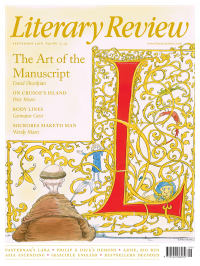Robert Mayhew
Seven Billion and Counting
How Population Change Will Transform Our World
By Sarah Harper
Oxford University Press 234pp £14.99
The study of population and the daily socioeconomic realities created by the aggregation of births, marriages and deaths may not sound the most exciting of subjects at first blush. And yet demography, from its origins in 17th-century Europe, has always attracted intense, passionate and sometimes downright hysterical reactions. Malthus, writing in the charged political atmosphere of the French Revolution, countered utopian visions of societal advance with the dour demographic pronouncement that ‘population cannot be checked without producing misery or vice, the ample portion of these too bitter ingredients in the cup of human life’. Similarly extreme views were rehearsed in the 1960s and 1970s, with some advocating the use of sterilising agents in public water supplies to limit populations while others saw increasing numbers as the ‘ultimate resource’ for economic growth. The polarisation of opinion continues in our own era: with the world’s population projected to reach ten billion this century, one prominent commentator suggested in 2013 that we should stop worrying while another concluded, ‘I think we’re fucked.’
In this context, it comes as something of a relief that the only grandiloquent gesture in Sarah Harper’s study of global demography is its title. Otherwise, her book proves to be a reliable and intelligent guide, offering the reader a coherent and crystal-clear briefing on the varied demographic

Sign Up to our newsletter
Receive free articles, highlights from the archive, news, details of prizes, and much more.@Lit_Review
Follow Literary Review on Twitter
Twitter Feed
Margaret Atwood has become a cultural weathervane, blamed for predicting dystopia and celebrated for resisting it. Yet her ‘memoir of sorts’ reveals a more complicated, playful figure.
@sophieolive introduces us to a young Peggy.
Sophie Oliver - Ms Fixit’s Characteristics
Sophie Oliver: Ms Fixit’s Characteristics - Book of Lives: A Memoir of Sorts by Margaret Atwood
literaryreview.co.uk
For a writer so ubiquitous, George Orwell remains curiously elusive. His voice is lost, his image scarce; all that survives is the prose, and the interpretations built upon it.
@Dorianlynskey wonders what is to be done.
Dorian Lynskey - Doublethink & Doubt
Dorian Lynskey: Doublethink & Doubt - Orwell: 2+2=5 by Raoul Peck (dir); George Orwell: Life and Legacy by Robert Colls
literaryreview.co.uk
The court of Henry VIII is easy to envision thanks to Hans Holbein the Younger’s portraits: the bearded king, Anne of Cleves in red and gold, Thomas Cromwell demure in black.
Peter Marshall paints a picture of the artist himself.
Peter Marshall - Varnish & Virtue
Peter Marshall: Varnish & Virtue - Holbein: Renaissance Master by Elizabeth Goldring
literaryreview.co.uk